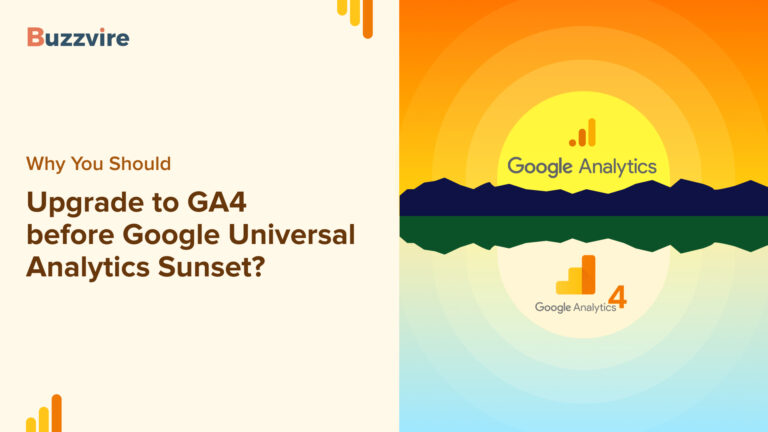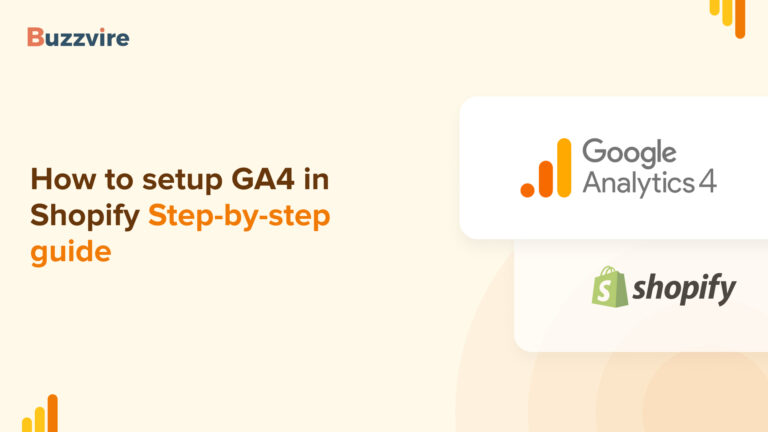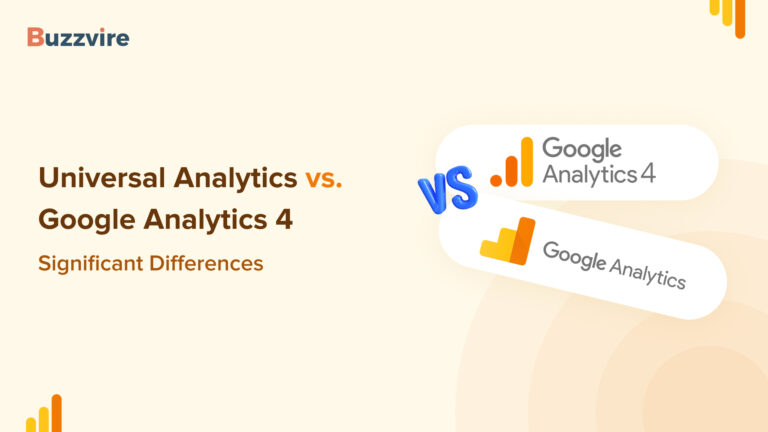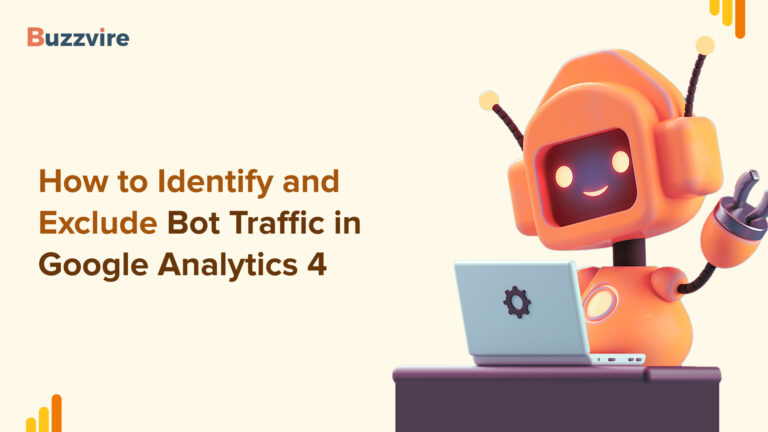Everything (from pageviews to purchases) is treated as an event in Google Analytics 4, as was mentioned at the time.
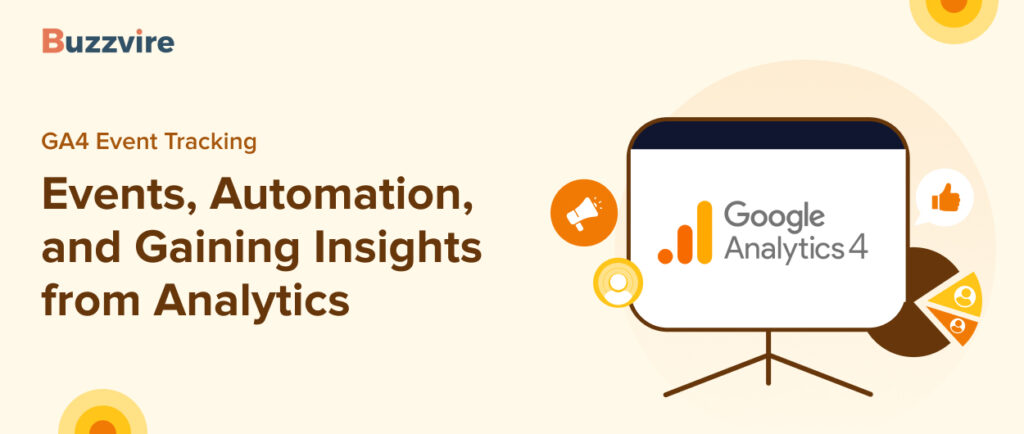
Even today, this instrument has a wealth of information to glean from; for example, see GA4 Ecommerce Tracking Via GTM. Finally, we’ll get into GTM’s Automating process for GA4 in further detail.
Data analytics is becoming more automated as AI and ML grow more pervasive in our daily lives, and we can all agree that this will make keeping tabs on things more accessible and enjoyable.
We will now discuss the different event categories in GA4:
- Automatically collected events
- Enhanced Measurement events
- Recommended events
- Custom events
We would love to discuss all these events with you in-depth, but in this post, we will focus on automating GA4 event tracking.
Automatically Collected Events
On specific predetermined user activities, these events are automatically generated and recorded.
Activities that have already been planned:
- A mobile user’s click on an advertisement
- Displaying a mobile ad on a screen
- Ads are seen on a mobile device
- A software failure
- File downloading
- A mobile app’s screen transition
- Getting to the last section of a webpage
- Initiation of video playback and video development
- You may search the site or do other things when the video stops.
Keep in mind that these are only a few examples.
These events are automatically gathered without further coding or labeling once GA4 is set up on the website or the GA4 SDK is installed on the app.
For your perusal, Google has compiled a detailed list, including improved measurement events.
Automatically gathered events may include a user’s initial visit, how actively they participate in a session, and more.
Want to know why the beginning of a session is considered an event? Keep in mind that in GA4, everything is an event.
Simple actions taken inside your app and website (as shown by the event name in the next section) trigger automatically collected events. You don’t have to add more code to capture these events using Google Analytics for Firebase SDK or gtag.js.
Unless otherwise specified, Android and iOS app events are collected by Analytics. When accessing your raw event data in BigQuery, the names and parameters of these events might come in handy.
Event Parameters and Limits in GA4
This includes custom events, which also gather the following parameters by default. The following parameters are only used for automatically collected events not specified in the table below.
- language
- page_location
- page_referrer
- page_title
- screen_resolution
Event parameters may only have values of 100 characters or less. There is a limit of 300 characters for the page_title argument. You’re limited to 420 characters for the page_referrer argument. There’s a hard limit of a thousand characters on the page_location argument.
Provide a valid URL path if you decide to alter the page_location argument. The Page location dimension will be blank if an incorrect URL path is assigned. The Campaign URL Builder allows you to validate a URL route.
How to access GA4’s Automatically Collected Events?
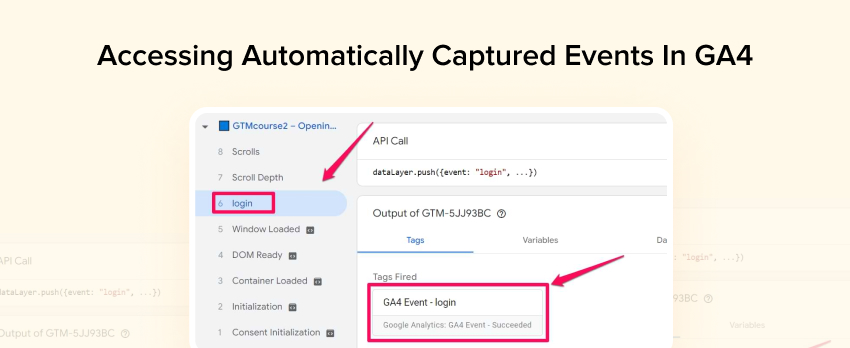
If you’re looking for events gathered automatically, they should be in the “All Events” reports.
Here are the steps to take to locate your automatically collected events.
Step 1: Select the “Report” tab on your GA4 reporting window.
Step 2: Move on to the “Engagements” tab.
Step 3: The “Events” link is under “Engagements,” so go ahead and click there.
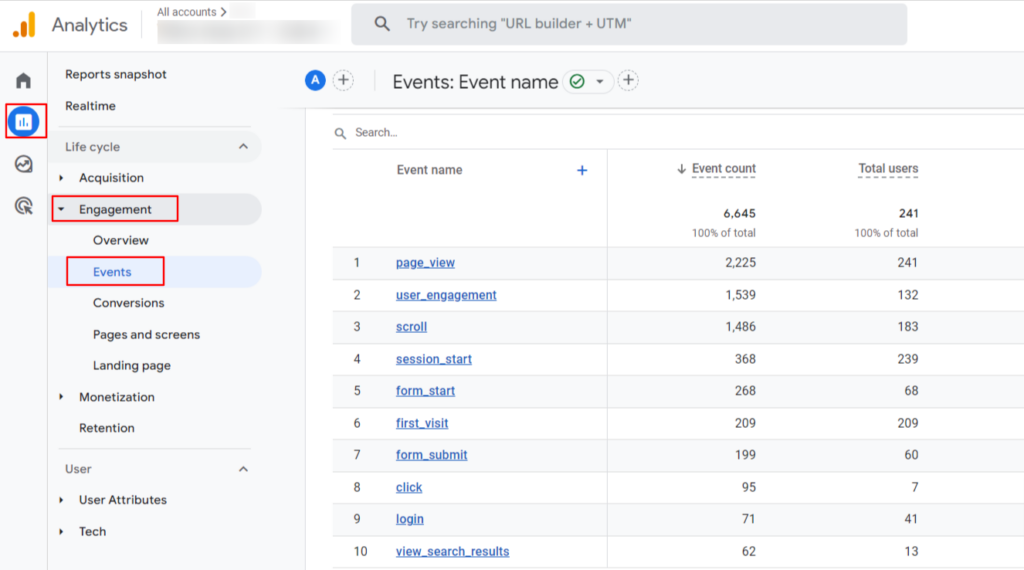
Reporting in GA4 now includes a complete history of all events gathered automatically.
Event Sequences, Triggers, and Parameters
Here, we detail the sequence of events and the conditions under which they will trigger. The events’ parameters are also provided.
ad_click (app)
Once a user interacts with an advertisement, the event is triggered.
Incoming AdMob events for publishers using the Google Mobile Ads SDK and Ad Manager events for publishers using the Ad Manager integration
BigQuery is not populated with this particular event.
Parameter: ad_event_id
ad_exposure (app)
This will be triggered when the Mobile Ads SDK serves at least one ad.
Reports and BigQuery exports do not include this event.
Parameter: firebase_screen, firebase_screen_id, firebase_screen_class, exposure_time
ad_impression (app)
When a user views an advertisement, the event is triggered.
Incoming AdMob events for publishers using the Google Mobile Ads SDK and Ad Manager events for publishers using the Ad Manager integration
BigQuery is not populated with this particular event.
Parameter: ad_event_id, value
ad_query (app)
This event will be triggered whenever the Mobile Ads SDK requests an advertisement.
No information about this event is exported to BigQuery or included in any reports.
Parameter: ad_event_id
ad_reward (app)
The user receives a reward when the Mobile Ads SDK serves a rewarded ad.
Parameter: ad_unit_code, reward_type, reward_value
adunit_exposure (app)
When a mobile advertising software development kit ad unit is shown.
Reports and BigQuery exports do not include this event.
Parameter: firebase_screen, firebase_screen_id, firebase_screen_class, exposure_time
app_clear_data (app)
When users delete their app’s data, they erase any personal information they entered during sign-up or setup.
Android only
app_exception (app)
When an application error occurs or an exception is thrown.
When Firebase Crashlytics is integrated, the event is transmitted.
Parameter: fatal, timestamp, engagement_time_msec
app_remove (app)
When an Android app is uninstalled, all associated files are deleted.
Android only
This event is distinct from the Google Play Developer Console’s daily uninstalls by device and daily uninstalls by user statistics. The app_remove event tracks the removal of application packages, and the number varies based on the time frame of the report and the original installation method. Only software packages installed from Google Play are included in the Daily uninstalls by device and Daily uninstalls by user stats, published daily.
app_store_refund (app)
Google Play refunds an in-app purchase if and only if: Only Androids.
BigQuery is not populated with this particular event.
Parameter: product_id, value, currency, quantity
app_store_subscription_cancel (app)
Google Play’s cancellation of a paid membership.
Only Androids
Requires an initial subscription date of July 1, 2019 or later.
BigQuery is not populated with this particular event.
Parameter: product_id, price, value, currency, cancellation_reason
app_store_subscription_convert (app)
When a trial membership is upgraded to a premium plan.
An automatic transformation to this event has been established.
The first payment must have been received on or after July 1, 2019. The subscription option is true when an in_app_purchase is made for a free trial membership.
The BigQuery export for this event failed.
Parameter: product_id, price, value, currency, quantity
app_store_subscription_renew (app)
When a membership is renewed for a fee.
An automatic transformation to this event has been established.
The first payment must have been received on or after July 1, 2019.
The BigQuery export for this event failed.
Parameter: product_id, price, value, currency, quantity, renewal_count
app_update (app)
Whenever a new version of the program is released.
The ID of the prior version of the app is provided as a parameter.
While Google Play Developer Console does provide daily updates per device, this event is distinct in concept from that measure. An upgrade changes the application’s binary, whereas an app_update event occurs when the updated app is launched.
Parameter: previous_app_version
click (web)
Every time a user leaves the current domain by clicking a link.
All connections outside the current domain will generate outbound click events automatically. Outbound click events will not be triggered by links on cross-domain measured domains.
These settings determine the values for the following scales:
- Types of links (obtained from link_classes).
- Domain of links (from link_domain)
- ID of the link (from link_id)
- Hyperlink address (derived from link_url)
- Outbound (from outbound)
Enhanced measuring allows for automatic collection.
Parameter: link_classes, link_domain, link_id, link_url, outbound (boolean)
dynamic_link_app_open (app)
If the user starts the program again from a dynamic link.
Parameter: source, medium, campaign, link_id, accept_time
dynamic_link_app_update (app)
When a dynamic link is used to access an updated software version.
Only Androids
Parameter: source, medium, campaign, link_id, accept_time
dynamic_link_first_open (app)
After clicking on a dynamic link, the first time a user launches the app.
Remember that Firebase Dynamic Links is now deprecated; thus, this celebration will eventually end.
Parameter: source, medium, campaign, link_id, accept_time
error (app)
It is substituted for an incorrect event that would otherwise be recorded.
You may find additional data in the _err (firebase_error), _ev (firebase_error_value), and _el (firebase-error-length) parameters.
Neither reports nor BigQuery exports have information about this event.
Parameter: firebase_error, firebase_error_value
file_download (web)
When a person visits a page that directs them to any of the following file formats (using a common file extension):
- Files
- Text
- Programs and Presentations
- compressed video and audio file
Enhanced measurement is used to gather this event automatically.
Parameter: file_extension, file_name link_classes, link_id, link_text, link_url
firebase_campaign (app)
When the app is released with the parameters for a campaign.
Reports and BigQuery exports do not include this event.
Parameter: source, medium, campaign, term, content, gclid, aclid, cp1, and, click_timestamp, campaign_info_source
firebase_in_app_message_action (app)
Every time a user responds to a Firebase In-App Message.
Parameter: message_name, message_device_time, message_id
firebase_in_app_message_dismiss (app)
User-rejecting Firebase In-App Message.
Parameter: message_name, message_device_time, message_id
firebase_in_app_message_impression (app)
Failed Firebase In-App Message with Rejecting Users.
Parameter: message_name, message_device_time, message_id
first_open (app)
The first run of an application following fresh installation or reinstallation.
This happens not when the program is installed but when the user first uses it. The Google Play Developer Console and the iTunesConnect may be used to see raw download counts.
You can track first-open conversions for users who agree to Apple’s app-tracking popup in iOS 14.
Parameter: previous_gmp_app_id, updated_with_analytics, previous_first_open_count, system_app, system_app_update, deferred_analytics_collection, reset_analytics_cause, engagement_time_msec
first_visit (app, web)
When someone uses your website or instant app for the first time, you have Analytics set up on their Android device.
form_start (web)
When a user fills out a form for the first time throughout a session.
You need to make your measurements for the parameters to be able to utilize them in your reports.
Enhanced measuring allows for automatic collection.
Parameter: form_id, form_name, form_destination
form_submit (web)
When a user initiates the first form submission during a session.
You can only use the parameters in your reports if you do your measurements.
Automatic data collecting is now possible thanks to improved measurement.
Parameter: form_id, form_name, form_destination, form_submit_text
in_app_purchase (app)
The Apple App Store or Google Play handles the transaction when a user purchases the app, including a new subscription.
Quantity, currency, and both the product ID and name are also included as parameters.
The Google Analytics for Firebase SDK must be in your app for this event.
Android:
Google Play can be connected to Analytics, so in-app purchase data may be seen for Android applications.
It’s important to remember that Analytics does not routinely track money made through in-app purchases. The numbers in the Google Play Developer Console won’t match the ones in Google Analytics, where you record your earnings.
Events that are marked as invalid or tests are disregarded by analytics. Find out how to put Google Play Payments testing to the test.
iOS:
Remember that Analytics does not routinely track money made or lost from in-app purchases or refunds.
Invalid or sandboxed events are disregarded by analytics.
Parameter: product_id, price, value, currency, quantity, subscription, free_trial, introductory_price
notification_dismiss (app)
The moment a user closes a message from Firebase Cloud Messaging (FCM).
Just Androids
Parameter: message_name, message_time, message_device_time, message_id, topic, label, message_channel
notification_foreground (app)
When a notice that FCM issued is received, the app is at the forefront of the user’s attention.
Parameter: message_name, message_time, message_device_time, message_id, topic, label, message_channel, message_type
notification_open (app)
Every time a user views a notice that FCM provided.
Parameter: message_name, message_time, message_device_time, message_id, topic, label, message_channel
notification_receive (app)
A device receives a notification when the app is in the background, as is when FCM delivers the notice.
iOS is not supported.
Parameter: message_name, message_time, message_device_time, message_id, topic, label, message_channel, message_type
os_update (app)
When a new version of the device’s operating system is installed, the ID of the previous operating system version is sent as a parameter.
Parameter: previous_os_version
page_view (web)
Whenever the page loads or the active site makes a change to the status of the browsing history in the browser
It is collected automatically by the use of increased measurement.
Parameter: page_location (page URL), page_referrer (previous page URL), engagement_time_msec
screen_view (app)
When there is a transition from one screen to the next, and any of the following conditions are met:
- There had been no prior screen set.
- The new screen name is distinct from its predecessor in several ways.
- The new screen-class name differs from the screen-class name used before.
- The new screen ID is different from the one that was used before.
Parameter: firebase_screen, firebase_screen_class, firebase_screen_id, firebase_previous_screen, firebase_previous_class, firebase_previous_id, engagement_time_msec
scroll (web)
The moment a user initially reaches the bottom of each page (when they can see 90% of the page’s vertical depth).
They are collected automatically using the upgraded measuring method.
Parameter: engagement_time_msec
session_start (app, web)
Whenever a user interacts with the website or app.
Every session has its unique identifier, or session ID, as well as a session number, and they are connected with every event that occurs during the session.
user_engagement (app, web)
When the application is at the forefront of the screen or when the site has been in focus for at least a second.
Parameter: engagement_time_msec
video_complete (web)
After the video has finished playing
YouTube videos that have been embedded have enabled the JS API support option.
Gathered automatically via the use of improved measurement.
Parameter: video_current_time, video_duration, video_percent, video_provider, video_title, video_url, visible (boolean)
video_progress (web)
After the video has passed the 10%, 25%, 50%, and 75% mark in terms of its runtime time.
YouTube videos with the JS API support option enabled are embedded.
Parameter: video_current_time, video_duration, video_percent, video_provider, video_title, video_url, visible (boolean)
video_start (web)
The moment when the video begins to play.
Parameter: video_current_time, video_duration, video_percent, video_provider, video_title, video_url, visible (boolean)
view_search_results (web)
Whenever a query parameter is included in the URL, it indicates that a user has performed a search on the site.
Parameter: search_term, optionally ‘q_<additional key=”>’ (where <additional key=”> matches another query parameter you specify to be collected under advanced settings)
Remember that this event will only trigger the unique_search_term parameter’s transmission if its value is 1 (indicating that the string in question is to be handled as a unique entity inside the current session).

FAQs:
Problems with automation, such as false data from incorrect setup, missing events, and incompatibility with older code, are commonplace in GA4 event tracking. Accurate and complete data tracking issues may be fixed by adhering to GA4’s implementation recommendations, regularly testing events, and adapting old code to meet GA4’s standards.
Tips for Efficiently Recording Events in Google Analytics
– You should turn off event monitoring if the non-interaction event hurts your website’s bounce rate.
– We should avoid having ‘event action’ titles that sound too similar across different events.
– Before beginning event tracking, you should consider how you want the system to be organized.
Yes, Google Tag Manager (GTM) allows for individualized event monitoring so that you may observe your behavior. With GTM, you can create unique triggers for specific user activities like clicks, form submissions, video plays, and more. To effectively monitor and report on what matters most to your company, define these triggers and connect them to appropriate tags.
After installation, make sure everything is functioning correctly. You should review the data you’ve been given. Once everything is set up correctly, you should receive events in your “Events Overview.” Follow this path in GA: Actions > Events > Overview. All incoming data is displayed here for your perusal.
One of the most essential features of Google Analytics 4 is the ability to monitor events, which provides invaluable information to marketers about how users engage with their websites. Events are the pieces of user behavior that marketers want to monitor and analyze in GA4, including button clicks, video views, and form submissions.


